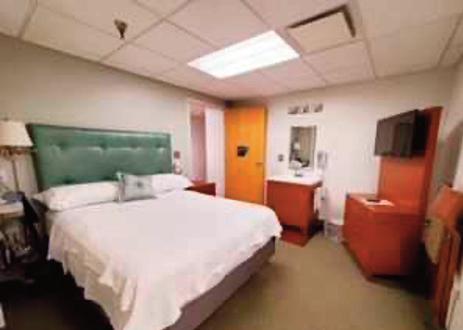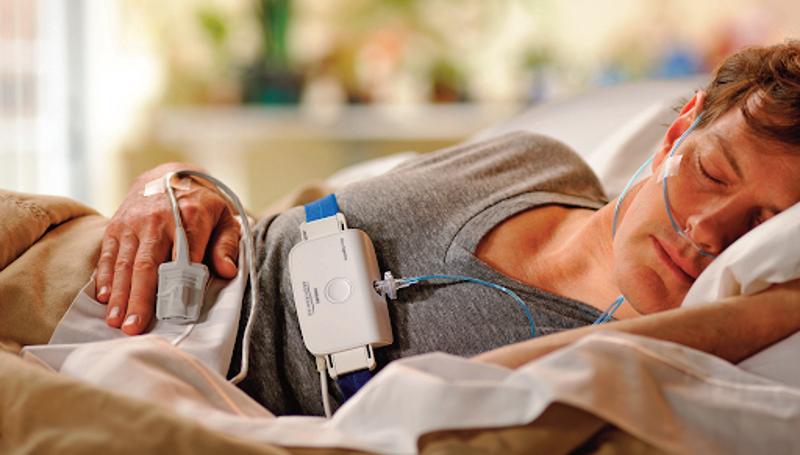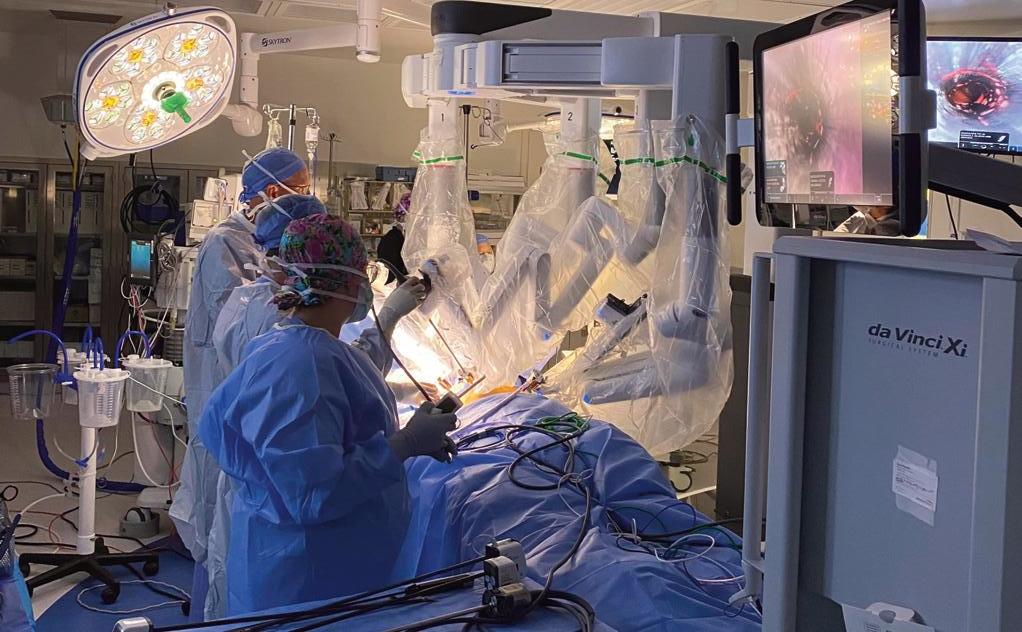
4 minute read
n Managing Sleep Apnea During COVID-19
Robotic Pulmonary Segmentectomy at Excela Health (continued)
In my role as medical director of thoracic surgery and director of the robotic surgical program at Excela, I have performed more than 100 pulmonary segmentectomies. Interestingly, the procedure dates back to the surgical treatment of Tuberculosis. What is new, however, is the ability for surgeons to be able to perform these procedures using minimally invasive techniques. Many of our patients stay only one day in the hospital after the procedure. We also know that for many patients segmentectomy offers long-term survival equivalent to lobectomy.
The Excela Advanced Lung Center and The Center for Lung and Thoracic Disease see more than 4,500 patients per year. To make a referral for patients with pulmonary nodules, suspected lung cancer or esophageal disease, please call 724-689-0520.
Michael Szwerc, MD, FACS
Medical Director, Robotic Surgery Director of Center for Lung and Thoracic Disease
Thoracic and Pulmonary Services
• Robotic assisted lung resection • Robotic assisted esophageal resection • Robotic/Laparoscopic assisted Paraesophageal Hernia Repair • Robotic assisted Nissen/Toupet/Dor fundoplication • Endoscopic sympathectomy for hyperhidrosis • Thoracic outlet procedures • Bronchoscopy with EBUS biopsy • Navigational Bronchoscopy • Video Mediastinoscopy • Tracheal surgery • Esophageal, bronchial, tracheal stenting • Chest wall resection and reconstruction • Management of pleural effusions • Pulmonary nodule management • Lung cancer screening • Robotic assisted Heller myotomy for achalasia • Mesothelioma surgery • Chemotherapy ports • Diaphragmatic plication/repair of diaphragmatic hernia • Esophageal diverticulectomy • Management of pneumothorax • Management of mediastinal masses • Robotic assisted thymectomy
Managing Sleep Apnea During COVID-19
Obstructive sleep apnea (OSA) is the most common sleep-related breathing disorder, affecting up to 10-15% of men and 4-6% of women in the United States. In patients with OSA, repeated collapse of the upper airway during sleep can result in airflow interruptions, intermittent oxygen desaturation, and fragmented nonrestorative sleep. Untreated OSA has been associated with increased morbidity and mortality, with negative effects on hypertension, coronary artery disease, arrhythmias, heart attack, pulmonary hypertension, diabetes mellitus, and other cardiovascular and metabolic disease. It has been adversely associated with depression, mood disorders, cognitive function, driving safety, and overall quality of life. Evaluation and treatment often require a sleep study to confirm diagnosis and titrate positive pressure therapy.
The management of sleep apnea has been a challenge during the COVID-19 pandemic, primarily due to concerns of increased risk of transmission during a sleep study and aerosol generating procedures. As the case rate of COVID-19 rises, many sleep studies have been postponed or cancelled. However, recent data suggest that OSA may be an independent risk factor for worse clinical outcomes in patients with COVID-19 infection (Sleep Medicine Reviews, Feb 2021), highlighting the importance of addressing sleep apnea in high-risk patient populations.
Managing Sleep Apnea During COVID-19 (continued)
The Excela Health Advanced Sleep Center has implemented a number of new protocols and upgrades for COVID-19 that meet or exceed guidelines set forth by the American Academy of Sleep Medicine. These risk mitigation strategies ensure continued care of our sleep patients, while optimizing safety for patients and staff.
n Negative pressure rooms: Excela Health is the only facility in the region that has outfitted sleep lab rooms with negative pressure technology to decrease the spread of airborne pathogens. Typically available only in a hospital setting, negative pressure ventilation has been retrofitted in the rooms at our Latrobe sleep lab facility. n Enhanced screening: Patients undergo screening for COVD-19 at three separate timepoints: 1) at the time of scheduling the appointment, 2) during a reminder call 24-48 hours prior to their sleep study, and 3) upon arrival to the sleep lab. Patients identified as high risk for COVID-19 infection are rescheduled and referred for evaluation and self-quarantine. n Individualized, staggered check-in: Patients are met individually at the entrance to the sleep lab and undergo a temperature check. Each patient completes registration and set-up for their sleep study before the next patient is brought in to minimize risk of exposure, separating patients in space and time. n Personal Protective Equipment (PPE) and Enhanced Cleaning Protocols: Sleep technicians are fully equipped with PPE to ensure safety for patients and staff. Enhanced cleaning protocols are used for each room before and after every patient. Another option for many patients is a home sleep test (HST). HST units consist of multiple sensors (nasal canula for airflow, chest belt for respiratory effort and pulse oximeter) that can be used to diagnose OSA. Done in the comfort of a patient’s own home, HSTs offer accurate and convenient sleep testing, while minimizing risk of COVID-19 exposure.

The Excela Health Advanced Sleep Center has augmented its program for home sleep testing. Additional HST units are now available and patient access has been enhanced. After evaluation by a sleep physician or other medical provider, a patient or family member can schedule an appointment to pick up equipment. Education and instruction are provided by the sleep staff at that time. Units are worn for one or two nights, then returned for data upload and physician review.
To meet the needs of an increasing number of sleep patient referrals, additional board-certified sleep physicians and nurse practitioners have also been hired to join our existing team of providers. Teleheath and in-person visits are available for patient convenience.
Despite the impact of the COVID-19 on patient care, Excela Health will continue to provide the best possible care for sleep patients.

Euhan John Lee, MD
Medical Director, Center for Sleep and Breathing Disorders Excela Health




